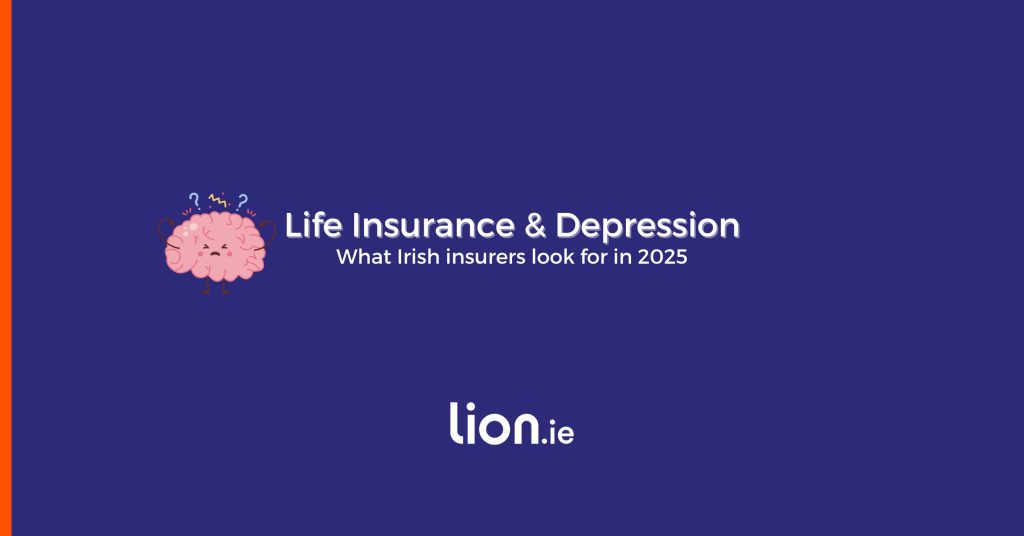10-second summary: You can get life insurance, mortgage protection or income protection with depression in Ireland. Mild or well-managed depression is often accepted at standard rates; more severe or recent episodes may lead to loadings or postponements. Suicidal thoughts or in-patient treatment within two years usually require a period of stability before insurers will offer cover.
Editor’s note: First published 2017 | Refreshed November 2025 with updated Irish underwriting rules, 2025 depression guidelines, and clearer mortgage-protection expectations.
Depression is incredibly common in Ireland.
Insurers see it every day, and it rarely stops anyone from getting life insurance or mortgage protection.
But the process can still feel overwhelming, especially when you’re asked to discuss something so personal with a stranger.
This guide walks you through exactly how Irish insurers underwrite depression, anxiety and stress in 2025 — and what to expect depending on your history. If you’d prefer a broader overview, see our full mental health life insurance guide.
Can you get mortgage protection if you have depression?
If you’re worried your depression means the bank won’t let you draw down — breathe.
Depression is one of the most common medical issues insurers see.
You’re not unusual, you’re not a red flag, and you’re not going to be punished for being honest.
Here’s the reality in Ireland in 2025:
- Mild or well-managed depression: most people get mortgage protection at normal rates.
- Recent counselling, a medication change, or symptoms in the last year: the insurer may request a short GP report but cover is usually fine.
- A more severe episode in the past: a loading (extra cost) is possible, but cover is still available.
However:
- Suicidal thoughts, ideation or an attempt within the last 2 years almost always leads to a postponement.
- Recent in-patient psychiatric treatment usually results in a postponement until there’s a period of stability.
- Depression with a history of substance abuse also makes it more difficult to get cover.
Postponement doesn’t mean decline — it simply means insurers want to see a stable period first.
If you’ve previously been turned down, have a look at what to do if you’re declined for life insurance.
If you want me to check what’s possible for your situation, complete the short mental health questionnaire and I’ll review it personally.
Anxiety, stress and panic attacks
Alongside depression, anxiety and stress are now the most common mental-health disclosures on Irish life insurance forms. Insurers see:
- Generalised anxiety
- Work-related stress or burnout
- Panic attacks
- Short-term counselling or CBT
In most cases, these do not prevent you getting mortgage protection or life insurance.
Typical outcomes:
- Mild, well-managed anxiety: standard rates are common.
- Recent panic attacks: insurers may ask for a GP report.
- Stress leave from work: a small loading is possible.
- Ongoing specialist care: depends on stability, but cover is usually still possible.
How insurers define depression
Insurers use clinical definitions based on GP or specialist notes. In simple terms:
- Mild depression: some impact on daily life.
- Moderate depression: significant impact on daily life.
- Severe depression: daily life becomes very difficult or impossible without support.
Triggers vary — bereavement, relationship breakdown, work stress, illness, trauma, or financial pressure.
A quick reassurance:
Being on medication (SSRI/SNRI) is not a red flag.
Insurers see sertraline, fluoxetine, citalopram etc. every single day.
If you want to understand the full underwriting process, here’s a simple breakdown of how life insurance works in Ireland.
How depression affects Irish life insurance applications
When reviewing a case, insurers look at:
- How severe the depression was/is
- Whether it was a single episode or part of a recurring pattern
- How recently symptoms occurred
- Medication and treatment history
- Any history of self-harm or suicidal thoughts
- Any related alcohol or substance misuse
Alcohol/substance use matters because high intake can worsen symptoms or make relapses more likely — so it will always be considered.
Mild, well-controlled depression: often standard rates.
Moderate or severe depression: loadings of 50%–150% are common.
Recent severe symptoms or hospitalisation: may lead to postponement.
This is why picking the right insurer matters — some are much more understanding than others.
The mental health questionnaire
We’ll ask you to complete a mental health questionnaire with details such as:
- When you first sought help
- Symptoms and duration
- Current stability
- Medication history
- Counselling or CBT
- Any specialist treatment
- Any self-harm history
- Triggers (e.g. bereavement, work stress)
- Diagnosis from GP or specialist
- Any time off work
We then discuss your case anonymously with all five insurers to see which one will give you the best terms.
Sometimes a questionnaire alone is enough.
If not, the insurer may request a GP report.
If you’re also dealing with bipolar disorder, the approach is different — and usually more dependent on long-term stability.
Income Protection with Depression
Income protection is stricter than life insurance or mortgage protection.
A few key points:
- If you’ve had symptoms in the last 5 years: many insurers will add a mental-health exclusion.
- If symptoms were mild and resolved over 3 years ago: some insurers may offer full cover.
- Severe episodes, suicidal thoughts, or in-patient treatment: an exclusion is very likely.
Every insurer has its own approach — which is why it’s essential to match your situation to the right one.
For general provider differences, see compare Irish income protection insurers.
Case Study: Income Protection after a marital breakdown
Molly separated from her partner four years ago, experienced anxiety and sleeplessness, took occasional medication, and attended counselling. Her symptoms resolved three years ago. We reviewed her case with all five income protection providers.
Responses ranged from “minimum mental health exclusion” to “no exclusion required”.
Three insurers wanted to exclude mental health; two did not.
Molly secured full income protection with one of the more understanding insurers.
Moral of the story: the insurer you choose matters — a lot.
Over to you…
If you’d like help finding the most understanding insurer, complete the mental health questionnaire or email me directly at nick@lion.ie. All conversations are strictly confidential.

Written by Nick McGowan, QFA RPA APA
Nick is a qualified financial advisor and founder of Lion.ie, an independent Irish life-insurance and income-protection brokerage based in Tullamore. He’s been helping people get fair, transparent cover for over 15 years — and was named Protection Broker of the Year 2022.
If you’d like straight answers (without the sales pitch), learn more about Nick here.

